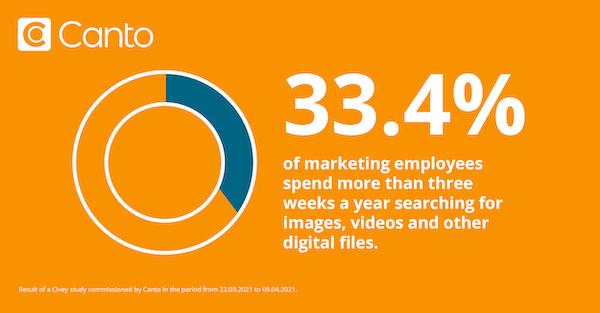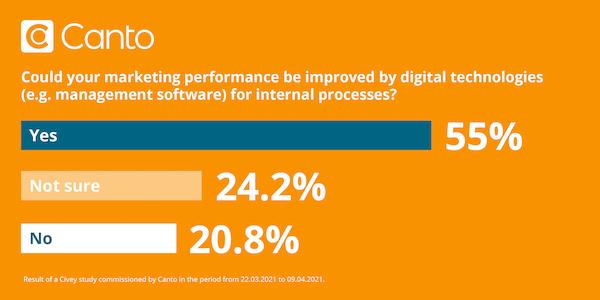New study: Marketing teams waste weeks every year searching for files
| September 6, 2021

Powerful images, memorable infographics, entertaining videos – content is an important pillar of digital marketing, and quite a lot of money and time goes into producing it. But just how much time do teams spend keeping track of that content? We wanted to know, so we conducted a survey.
In cooperation with the opinion research institute Civey, we asked more than 500 marketing experts what resources they spend searching for content and digital assets.
The results are in, and they are quite clear: far too many.
There’s some good news, though. The right tools make a difference. Good digital asset management solutions are an effective way to keep teams from wasting time and resources.
Searching for files is time-consuming
Imagine this scenario: The whole marketing team has been working on the new brochure for weeks. The only thing missing is that one product picture. Finding it on the server should be easy, shouldn’t it? Is it really saved to the server, though – or could it possibly be in the cloud? And where is that new video clip that we produced last month? Also, why are all the folders named like that? It’s like there’s no system at all.
Important assets might just disappear in an overly confusing and complex filing system. All of this makes the search for one specific file extremely difficult and time-consuming. Wanting to find out just how much time marketing teams spend searching for digital assets, we cooperated with the opinion research institute Civey to conduct a survey of marketing experts.

Teams spend three weeks a year just looking for files
Now the results are in, and they show that many marketing teams spend a lot of time searching for suitable content. Around a third (33.4%) of people working in marketing spend around three weeks per year searching for pictures, videos and other digital files. 15% of them spend up to six weeks a year (!) searching for content on disorganized servers and in the cloud.
Canto CEO Jack McGannon says: “The survey results are alarming. Brands are producing more content than ever before. When keeping track of all those digital assets becomes a drain on resources, companies aren’t seeing the returns on those investments they should expect.”
The survey also reveals what marketing experts have a clear idea of what they need to tackle the problem of disorganized digital media files: They want the right tools.

The solution: Intelligent tools
Many marketing experts count on digital solutions and artificial intelligence to make their jobs easier. More than half (55%) of the marketers we surveyed said that better tools would make their content management and performance more efficient.
“Many companies experience digital chaos. It seems almost unbelievable that staff is spending so much time and energy on searching for files. We want to make it possible for them to spend more time on their creative and strategic work,” says Jack McGannon.
Marketing professionals who know that they need better tools have already taken the first step. The next step is to find the right one. Canto’s digital asset management (DAM) solution has helped thousands of teams take control of their media libraries. While Canto offers a central location for all types of files, it’s so much more than just a media library. Thanks to tags, keywords and metadata, Canto is fully searchable, meaning teams no longer need to dig through messy folders to find what they need. And intelligent features such as automatic face recognition make search even easier.
That’s the good news for teams struggling with digital asset management. It’s definitely possible to control the flood of content – all you need is the right tool.
About the study
Canto commissioned the opinion research institute Civey to survey 500 marketing professionals. All participants were questioned between March 22, 2021 and April 9, 2021. The results are representative. The statistical error of the overall results is about 8%. The survey was carried out online. All participants supplied their personal data, such as age, sex and place of residence, and they were all registered and verified. Civey uses a multilevel weighting procedure to correct any distortion. More information about the method on civey.com.
